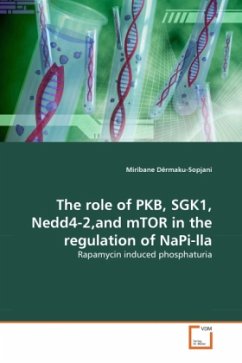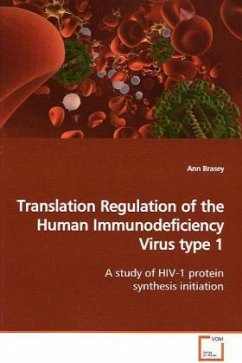
The Role of GRP78/BiP in Apoptosis Regulation and Cancer Progression
A Novel Target for Cancer Diagnosis and Therapy
Versandkostenfrei!
Versandfertig in 6-10 Tagen
32,99 €
inkl. MwSt.

PAYBACK Punkte
16 °P sammeln!
GRP78, a molecular chaperone at the endoplasmicreticulum (ER), is highly elevated in malignanttumors and correlates with severe pathological gradeand poor prognosis. GRP78 affects apoptosis byregulating ER Ca2+ signaling and unfolded proteinresponse, but whether other mechanisms exist remainsunknown. Searching for novel partners interactingwith GRP78 at the ER, we discovered that BIKselectively forms a complex with GRP78. GRP78overexpression decreases apoptosis induced by BIK.For breast cancer cells that require BIK to mediateestrogen starvation-induced apoptosis, GRP78overexpression inhibits ...
GRP78, a molecular chaperone at the endoplasmic
reticulum (ER), is highly elevated in malignant
tumors and correlates with severe pathological grade
and poor prognosis. GRP78 affects apoptosis by
regulating ER Ca2+ signaling and unfolded protein
response, but whether other mechanisms exist remains
unknown. Searching for novel partners interacting
with GRP78 at the ER, we discovered that BIK
selectively forms a complex with GRP78. GRP78
overexpression decreases apoptosis induced by BIK.
For breast cancer cells that require BIK to mediate
estrogen starvation-induced apoptosis, GRP78
overexpression inhibits estrogen starvation-induced
BAX activation, mitochondrial permeability
transition, and consequent apoptosis. Further,
knockdown of endogenous GRP78 by siRNA sensitizes
those cells to estrogen starvation. This effect was
substantially reduced when BIK level was reduced by
siRNA. Additionally, an in vivo study in a Pten
conditional knockout mouse model of prostate cancer
reveals that homozygous deletion of Grp78 blocks
prostate cancer progression initiated by Pten
nullification. Our results provide evidences that
GRP78 is critical in apoptosis regulation and cancer
progression.
reticulum (ER), is highly elevated in malignant
tumors and correlates with severe pathological grade
and poor prognosis. GRP78 affects apoptosis by
regulating ER Ca2+ signaling and unfolded protein
response, but whether other mechanisms exist remains
unknown. Searching for novel partners interacting
with GRP78 at the ER, we discovered that BIK
selectively forms a complex with GRP78. GRP78
overexpression decreases apoptosis induced by BIK.
For breast cancer cells that require BIK to mediate
estrogen starvation-induced apoptosis, GRP78
overexpression inhibits estrogen starvation-induced
BAX activation, mitochondrial permeability
transition, and consequent apoptosis. Further,
knockdown of endogenous GRP78 by siRNA sensitizes
those cells to estrogen starvation. This effect was
substantially reduced when BIK level was reduced by
siRNA. Additionally, an in vivo study in a Pten
conditional knockout mouse model of prostate cancer
reveals that homozygous deletion of Grp78 blocks
prostate cancer progression initiated by Pten
nullification. Our results provide evidences that
GRP78 is critical in apoptosis regulation and cancer
progression.












